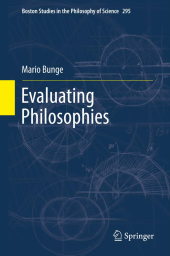 Neuerscheinungen 2014Stand: 2020-02-01 |
Schnellsuche
ISBN/Stichwort/Autor
|
Herderstraße 10
10625 Berlin
Tel.: 030 315 714 16
Fax 030 315 714 14
info@buchspektrum.de |

Mario Bunge
Evaluating Philosophies
2012. 2014. xiv, 202 S. 235 mm
Verlag/Jahr: SPRINGER NETHERLANDS; SPRINGER 2014
ISBN: 9401780870 (9401780870)
Neue ISBN: 978-9401780872 (9789401780872)
Preis und Lieferzeit: Bitte klicken
This book surveys philosophies that have had a significant positive or negative impact on the search for truth, offering systemism and materialism as research-nurturing doctrines. Covers problems under current discussion, and points out neglected topics.
The first part deals with philosophies that have had a significant input, positive or negative, on the search for truth; it suggests that scientific and technological are either stimulated or smothered by a philosophical matrix; and it outlines two ontological doctrines believed to have nurtured research in modern times: systemism (not to be mistaken for holism) and materialism (as an extension of physicalism).
The second part discusses a few practical problems that are being actively discussed in the literature, from climatology and information science to
economics and legal philosophy. This discussion is informed by the general principles analyzed in the first part of the book. Some of the conclusions are that standard economic theory is just as inadequate as Marxism; that law and order are weak without justice; and that the central equation of normative climatology is a tautology-which of course does not put climate change in doubt.
The third and final part of the book tackles a set of key concepts, such as those of indicator, energy, and existence, that have been either taken for granted or neglected. For instance, it is argued that there is at least one existence predicate, and that it is unrelated to the so-called existential quantifier; that high level hypotheses cannot be put to the test unless conjoined with indicator hypotheses; and that induction cannot produce high level hypotheses because empirical data do not contain any transempirical concepts. Realism, materialism, and systemism
are thus refined and vindicated.
_
Preface.- Introduction.-
A. How to Nuture of Hinder Research.-
1 Philosophies and phobosophies.-
2 The philosophical matrix of scientific progress.-
3 Systemics and materalism.-
B. Philosophy in Action.-
4 Technoscience?.-
5 Climate and logic.-
6 Information Science: one or many?.-
7 Wealth and wellbeing.-
8 Can standard economic theory explain crises?.-
9 Marxism: Promise and reality.-
10 Rules of law: Just and unjust.-
C Philosophical Gaps.-
11 Are subjective probabilities admissible? .-
12 Can induction deliver high-level hypotheses? .-
13 Bridging theory to data.-
14 Energy: physics or metaphysics? .-
15 Does quantum physics refute realism? .-
16 Parallel universes? ¨Digital physics? .-
17 Can functionalist psychology explain?.-
18 Knowledge pyramids and rosettes.-
19 Existence: one or two?.-
20 Conclusion: Evaluation Criterion.-
21 Glossary.


